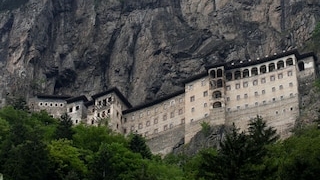Greece protests to Turkey over disco band at Sumela monastery
Athens (Reuters) – Greece’s foreign ministry said on Monday images showing a band dancing to electronic music at the former Orthodox Christian Sumela monastery in Turkey were “offensive” and “a desecration” of the monument.
The ministry called on Turkish authorities “to do their utmost to prevent such acts from being repeated” and to respect the site, a candidate for UNESCO’s list of world heritage sites.
“The recent images that were displayed on social media, in which a foreign band seems to be dancing disco in the area of the Historical Monastery of Panagia Soumela, are a desecration of this Monument,” it said.
Turkish officials were not immediately available for comment.
Founded in the 4th century, Sumela is a monastic complex built into a sheer cliff above the Black Sea forest in eastern Turkey. It was long ago stripped of its official religious status and operates as a museum administered by the Culture Ministry in Turkey.
Thousands of tourists and Orthodox Christian worshippers journey to the monastery annually.
In 2010, Turkish authorities allowed the first Orthodox liturgy since ethnic Greeks were expelled in 1923 as part of a population exchange between Greece and Turkey. In 2015, the Sumela monastery was shut for restoration and reopened to tourists in 2019.
A liturgy to mark the Feast Day of the Virgin Mary was allowed in 2020 and 2021.
“It is surprising that the permit was given to the band, as the Monastery of Panagia Soumela opens only for pilgrims,” the Greek foreign ministry said. “These images are offensive and add to a series of actions by the Turkish authorities against World Heritage Sites,” its statement said, without elaborating.
Greece and Turkey disagree on a range of issues from airspace to maritime zones in the eastern Mediterranean and ethnically split Cyprus.
The two countries have in the past crossed swords over the conversion of the nearly 1,500-year-old Hagia Sophia in Istanbul into a mosque. In July 2020 Islamic prayers were held at the ancient site for the first time in nine decades.



